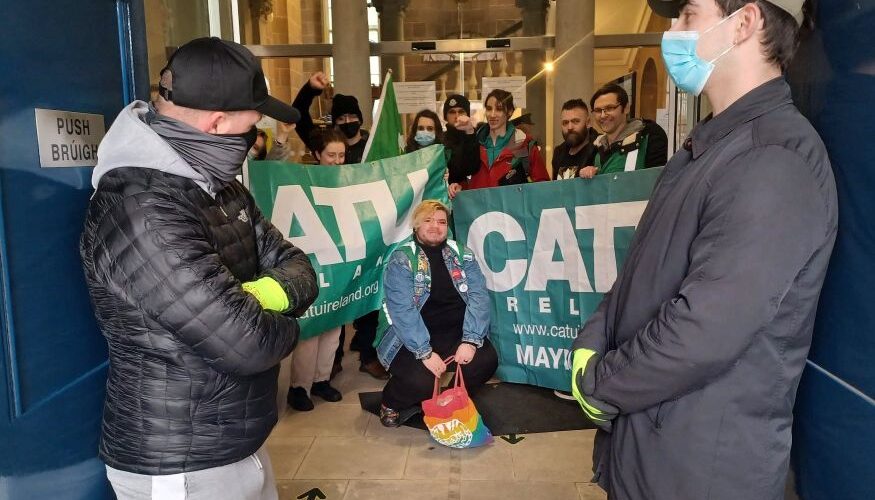On Friday the 31st of March, the Community Action Tenants Union (CATU) occupied the Department of Housing at the Custom House on the Dublin quays, with the goal of delivering a letter of demands for tenants’ protection and public housing to Housing Minister Darragh O’Brien. The Socialist Voice spoke to CATU activists to get the background of this event.
The action was a direct response to the lifting of the “eviction ban” by the government. 7,000 notices-to-quit have been issued since the ban was removed, putting this number of households at direct risk of eviction and homelessness. Recent news also showed that the Department of Housing failed to spend 1 billion euro which was designated for housing.
A CPI member who was present at the occupation mentioned: “I joined the occupation of the Department of Housing because I sometimes feel powerless. Our leaders don’t listen, I hoped the action would spark a conversation. What CATU asks for is not radical: my younger sister lives in Belgium, and when her apartment was sold she was not evicted like she would be here. In Dublin it feels like landlords are allowed to do anything. They will ask ridiculously high rents for studios that aren’t even fire safe. It’s not on.”
We spoke to Fiadh Tubridy, CATU organiser and postdoctoral researcher of geography at Maynooth University about this action. She mentioned: “CATU’s key demand is the reinstatement of the eviction ban, but this on its own is not enough. Further demands are the extension of the eviction ban to cover licensees, access to public housing for anyone that wants it, less reliance on the private rental sector, improved standards for emergency accomodation and the abolition of the inhumane direct provision system for asylum seekers.”
“We will never beat the government and private landlords using the legal system because they have more money, which they can use to pay people to write reports and lobby their interests. As the union of people who are affected by the housing crisis, we need to use the resources we have: strength in numbers, and a committed membership. This means direct action. Doing direct action also gives people a sense of their own power, and makes people understand we don’t need to rely on TDs, councillors and experts but we can take power into our own hands.”
“There are many examples in Irish history of people organising and taking collective action on housing problems. During the Land Wars, tenant farmers stopped paying rent and developed strategies to fight back such as the boycott, which was named after Lord Boycott, an agent for a British landlord. In the 1960s there was the Dublin Housing Action Committee (DHAC), which had many active CPI members. DHAC organised squatting, supported people to resist evictions, and prevented the conversion of housing into offices. After the financial crisis in the 2000s we saw groups like Take Back The City and the Dublin Central Housing Action, which supported people who were being evicted. Now CATU is trying to organise our communities so we can act collectively instead of as isolated individuals.”
“In the end Darragh O’Brien did not come to talk to us. He doesn’t want to deal with the consequences of his actions and be confronting the people he is putting at risk of homelessness. The Irish ruling class reflects the views of the landlord class, I’m sure he is fine with talking to landlord organisations. They are very organised and well connected, we have to be even more organised.”
The action at the Custom House was organised by CATU and supported by the Revolutionary Housing League, the Communist Party of Ireland, Anti-Imperialist Action, Connolly Youth Movement, People Before Profit, and Students 4 Change.






